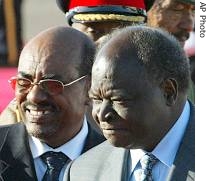2006年VOA标准英语-Somalia Government, Islamist Forces to Hold Tal(在线收听)
By Nico Gnecchi
Nairobi
30 August 2006
 Kenyan President Mwai Kibaki, left, with Sudanese President Omar El Bashir (File photo) |
||
-------
The Intergovernmental Authority on Development, a regional organization, including Djibouti, Eritrea, Ethiopia, Kenya, Somalia, Sudan and Uganda, says preparations have been made to dispatch African peacekeeping troops to Somalia by October.
Ethiopian Prime Minister Meles Zenawi and the Kenyan President Mwai Kibaki agreed during talks Tuesday to support the deployment of peacekeepers in Somalia to ensure political stability. Uganda has also voiced a strong commitment to sending troops.
The mission aims at strengthening the transitional government's limited authority in the southern and central regions of Somalia, including the capital Mogadishu where the Islamist courts have established control.
But the mission will meet some resistance.
The Islamists, who seized Mogadishu from factional warlords in June, have vowed to resist at any cost the deployment of peacekeepers. Sheikh Hassan Dahir Aweys, the spiritual head of the Islamic forces has openly threatened neighboring Kenya and Ethiopia for attempting to intervene. He has warned that Islamists will wage a holy war against any foreign invasion.
Peace negotiations expected to begin this week in the Sudanese capital Khartoum between the transitional government and Islamists, will focus on the issue of foreign forces, says Najum Mushtaq, a Somalia analyst.
"The idea of sending forces without the consent of the major factions in Somalia, which includes the Islamic courts, would of course be disastrous. In the talks beginning in Khartoum, foreign forces will be the main contentious point in those talks," he said.
Key members of Somalia's transitional government have also opposed an immediate and rushed deployment of foreign forces, calling for the training and financing of Somali national forces instead. But Ethiopia and Kenya have for a long time been worried about the event of a civil war breaking out and flowing across their borders.
Somalia has been without a functioning central government since the ousting of Mohamed Said Barre in 1991, an event that plunged the country into civil war.